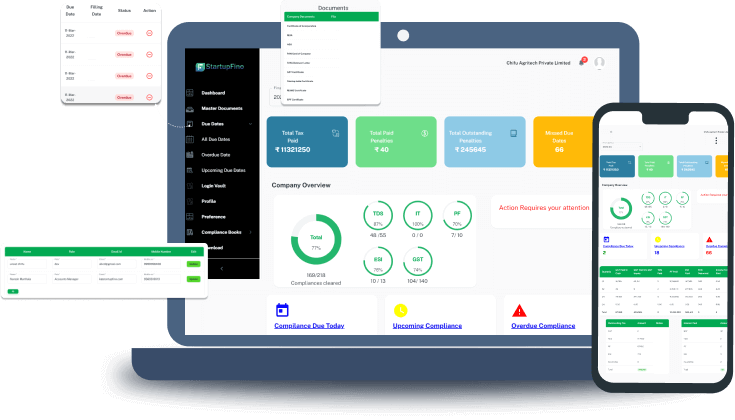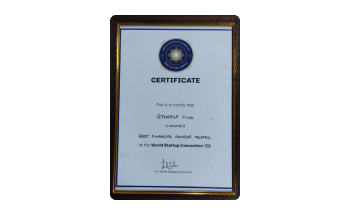Under the food safety laws of India, certain compliances for the food business owners have been given. One of the most important is FSSAI License Registration. There are three types of food license that have been given under the food safety laws of India. These licenses have been divided into three categories which includes basic licensing which is also known as the regular license as well, state licensing and central licensing.
The current blog will particularly deal with the FSSAI State License. Basically the applicability has been decided on the basis of the turnover of the business but when it comes to central FSSAI License it can be decided on the basis of the types of business as well. In order to get thorough knowledge regarding the state food license.
Key Functions of the Food Safety Standard Authority of India
The major functions of FSSAI has been mentioned in the table given below:
|
Functions of FSSAI
|
Details
|
|
Formulation of Guidelines and Norms
|
It formulates the different types of guidelines as well as norms according to which the food business owners need to do business in the food market of India.
|
|
Initiatives for Food Safety Awareness
|
In order to create food safety awareness and education, from time to time this authority initiated steps through which such awareness can be created.
|
|
Issuance of Directions for FBOs
|
Many types of directions have been issued in order to the food business owners in order to maintain the food safety in the Indian food market.
|
|
Norms for Food Testing Labs
|
Different types of norms has been
|
|
Data Accumulation on Contaminants
|
|
|
Recommendations to the Indian Government
|
The authority facilitates recommendations to the Indian Government for the formulation of new provisions, contributing to the continuous improvement of food safety regulations.
|
|
Utilisation of Rapid Alert System
|
FSSAI employs a rapid alert system to promptly identify and address issues related to food articles available to the public, ensuring swift responses to potential threats.
|
|
Stringent Norms for Proprietary Food Units
|
FSSAI has implemented stringent norms for proprietary food units, mandating them to obtain FSSAI licences without exception. Unregistered units are prohibited from conducting business operations without a valid food licence.
|
|
Regulation of Manufacturing, Storage, Sale and Distribution
|
|
|
Legitimate Information Network
|
|
Benefits of FSSAI State Licence
The benefits of obtaining the state licence from FSSAI includes:
- Enhancing Brand Recognition:
Acquiring a State Licence from FSSAI contributes to the creation of strong brand recognition among target end-users and the general public. The certification acts as a symbol of commitment to food safety and quality.
- Boosting Business Credibility:
The FSSAI Licence enhances the credibility of a business. It signifies adherence to regulatory standards, instilling confidence in consumers and business partners alike.
- Attracting More Customers:
Businesses with an FSSAI Licence are more likely to attract a larger customer base. The certification assures consumers that the food products offered meet established safety and quality standards.
- Legal Stability for Registered Businesses:
FSSAI Licence provides legal stability to registered businesses, offering protection against legal issues that may arise from non-compliance. This stability is important for sustained and uninterrupted business operations.
- Promoting Best Practices for Food Safety:
The FSSAI actively promotes best practices for food safety to business owners through its guidelines. This guidance assists businesses in implementing effective measures to ensure the safety and quality of their food products.
- Simplifying Supply Chain Management:
Businesses with FSSAI Licence benefit from a simplified supply chain management process. Compliance with FSSAI regulations ensures that the entire production and distribution chain meets the required standards, minimising disruptions.
- Consumer Trust and Loyalty:
The FSSAI Licence promotes trust and loyalty among consumers. Knowing that a business complies with food safety standards builds long-term relationships with customers who prioritise the safety of the products they consume.
Having an FSSAI State Licence opens doors to new markets. Many retailers, both online and offline, may require suppliers to have FSSAI certification, expanding the reach and market potential of businesses.
- International Recognition:
For businesses engaged in export activities, the FSSAI State Licence provides international recognition. It signifies that the products meet not only national but also international standards, facilitating entry into global markets.
- Continuous Improvement and Adaptation:
FSSAI encourages businesses to continually improve and adapt to changing food safety requirements. This commitment to ongoing improvement ensures that businesses stay ahead of emerging challenges and remain resilient in the dynamic food industry.
Types of FSSAI Licence in India
The different types of FSSAI licence in India include the following:
1. FSSAI Central Licence:
- Issued by the central government.
- Mandatory for Food Business Operators operating in more than one state.
- Applicable to FBOs such as exporters, importers, producers and operators.
- Meant for bigger units with annual turnover exceeding Rs. 20 crores.
2. FSSAI State Licence:
- Issued by the state government.
- Required for FBOs operating within a single state.
- Suitable for SMEs, retail chains, etc.
- Primarily granted to units with an annual turnover exceeding Rs. 12 lakhs and below Rs. 20 crores.
3. FSSAI Basic Registration:
- Issued by the state government.
- Applicable when the annual turnover is under Rs. 12 lakhs.
- Designed for FBOs like small-scale producers, dealers, hauliers, distributors, retailers, etc., meeting minimum specifications.
- Represents a simplified registration process for smaller businesses.
Key Features of FSSAI State Licence
The major features of the state licence issued by FSSAI includes:
- Legal Compliance and Penalties:
Failure to obtain an FSSAI licence puts food operators at risk of legal proceedings and penalties for non-compliance with food safety regulations.
Acquiring an FSSAI licence is a one-time expense for businesses. The duration of the licence validity is generally 1 year, depending on the scale and specific requirements of the business.
- Mandatory for All Food Operators:
Every individual involved in food operations, including manufacturing, retailing, transportation or any other dealings with food products, must obtain a state licence from FSSAI.
- Regulated by Food Safety and Standards Regulations 2011:
The issuance of a licence or certificate of registration is governed by the terms outlined in the Food Safety and Standards Regulations of 2011, ensuring standardised processes and compliance.
- Varied Requirements Based on Business Type:
The necessity for FSSAI licencing or registration varies based on the type and nature of operations of a food business.
Entities Requiring a State FSSAI Licence
Given below are the businesses who require a State FSSAI licence:
- Businesses Operating in a Single State with Annual Turnover:
Businesses operating within a single state with an annual turnover exceeding Rs 12 lakhs but less than Rs 20 Crores are mandated to obtain a State FSSAI Licence.
- Facilities Dealing with Proprietary Foods:
Any facility dealing with proprietary foods is required to obtain a State FSSAI Licence, ensuring compliance with food safety standards.
- Vegetable Oil Production & Processing Facility:
Vegetable oil production and processing facilities utilising solvent extraction and meeting the specified turnover criteria fall under the ambit of State FSSAI Licencing.
- Hotels with 4-Star Rating or Below:
Hotels with a rating of 4 stars or below are obligated to secure a State FSSAI Licence to ensure the safety and quality of the food they serve.
- Dairy Products Facilities and Milk Chilling Units:
Facilities dealing with dairy products, including Milk Chilling Units with a production capacity ranging from 500 to 50,000 litres, are required to obtain a State FSSAI Licence.
- Storage Facilities with Overall Capacity Below 50,000 Metric Tons:
Storage facilities with an overall capacity below 50,000 metric tons annually fall within the scope of obtaining a State FSSAI Licence.
- Slaughterhouses with Specific Capacities:
Slaughterhouses with a capacity exceeding 2 and up to 50 large animals or a handling capacity of more than 10 and up to 150 small animals or a per-day capacity of more than 50 and up to 1000 poultry birds are mandated to have a State FSSAI Licence.
- Food Processing Facilities, Including Re-packing Units:
All food processing facilities, which includes re-packing units, with per-day capacity of not less than 100 kg per litre and up till 2 metric tons are required to obtain a State FSSAI Licence to ensure adherence to food safety regulations.
Essential Documents for State FSSAI Licence Application
The basic set of documents required for state FSSAI licence are:
- Details of Key Management Personnel:
Provide comprehensive details of key management personnel, including Directors, Partners, Proprietors and Executive Members of the Society. Include real addresses and contact particulars for each individual.
Submit passport-sized photographs of the individual seeking the licence.
- Identification and Address Proof:
Furnish valid identification and address proof for the individual applying for the licence.
Include a copy of the PAN card for the applicant.
If the place of business is owned by the applicant, submit a copy of the property documents.
- Rent Agreement and NOC (In Case of Rented Property):
If the business premises are rented, provide a copy of the rent agreement and a No Objection Certificate granted by the landlord.
- Details of Raw Material Suppliers:
Include particulars regarding raw material suppliers for the proposed business.
- Form B (Duly Completed and Authenticated):
Submit Form B duly completed and authenticated by the applicant.
- List of Machinery Installed:
Provide a detailed list of machinery installed at the facility.
- NOC from Local Municipality:
Include a No Objection Certificate obtained from the local Municipality.
- Particulars of Food Category and Proposed Food Articles:
Specify the food category and provide details of proposed articles of food to be produced at the plant.
- Import Export Code (IEC) from Directorate General of Foreign Trade:
Include the Import Export Code issued by the Directorate General of Foreign Trade.
Submit Form IX as part of the application process.
Enclose an authorisation letter providing the name and address of the responsible individual.
- Food Safety Management System (FSMS):
Present details of the Food Safety Management System in place at the facility.
Ensuring the completeness and accuracy of these fundamental documents is essential for a successful application for a State FSSAI Licence.
FSSAI State Licence Fee Structure
To obtain an FSSAI State Licence, applicants are required to pay the prescribed fees, which can be submitted through the following methods:
- Demand Draft (DD)
- Treasury Challan
- Cash
Applicable Fees:
The fees vary based on the production capacity of the food business. The following table outlines the licence fees per year for different categories:
|
Manufacturer (Production Capacity)
|
Licence Fees/year (Rs.)
|
|
More than One million tons/day
|
5000/-
|
|
10001 up to 50,000 Litres/day of milk or 501 to 2500 Million tons of milk solids per annum
|
|
|
Lower than one Million tons of production
|
3000/-
|
|
501 up to 10,000 Litres per day of milk or 2.5 million tons to 500 million tons of yearly production of milk solid
|
|
|
Hotels having 4 stars rating
|
5000/-
|
|
All Food Service providers ( which includes restaurants, canteens and clubs, caterers, banquet halls who offer food catering services, Dabbawalla system, & other FBOs)
|
2000/-
|
Process for Obtaining FSSAI State Licence from Licencing Authority
Obtaining an FSSAI State Licence involves several important steps, ensuring compliance with food safety regulations and the smooth functioning of the business. The steps in this process are:
Step 1: Document Preparation and Application Filing
- Assemble all necessary documents mentioned earlier.
- File the application through Form B, providing comprehensive details about the business.
Step 2: Submission via FOSCOS Online Portal
- Submit the application form through the Food Safety Compliance System (FOSCOS) online portal.
- Complete the filing process by remitting the standard fees.
Step 3: Application Scrutiny by FSSAI Officials
- FSSAI officials conduct a thorough examination of the submitted application and supporting documents.
Step 4: On-Site Inspection
- If deemed necessary, FSSAI officials may conduct an on-site inspection of the business premises to assess compliance with safety standards.
Step 5: Granting of State FSSAI Licence
- Upon successful scrutiny and, if applicable, a satisfactory on-site inspection, the licencing authority grants the State FSSAI Licence.
Step 6: Commencement of Business Operations
- With the obtained licence, the business owner is authorised to commence their food-related operations.
- The licence must be prominently displayed at the business premises as a regulatory requirement.
Timeline for Grant of FSSAI State Licence
The process for obtaining an FSSAI State Licence follows a specific timeline, as given below:
The Food Business Operator submits a complete application for an FSSAI State Licence.
- Licencing Authority Review:
The Licencing Authority reviews the application, scrutinises the details and conducts inspections of the premises as needed.
The Licencing Authority aims to issue the FSSAI State Licence within 60 days of receiving a complete application. This includes the time taken for application scrutiny and premises inspection.
- Clarifications and Responses:
In case of clarifications raised by the Licencing Authority, the applicant has 30 days to respond and provide necessary information.
- Auto Rejection for Delayed Response:
Failure to submit a response within the stipulated 30 days may lead to auto-rejection of the application.
Commencement of Business:
If the Licencing Authority is unable to grant the FSSAI State Licence within 60 days from the date of a complete application and:
- Fails to point out defects in the application or
- No clarification is sought after the inspection of the food unit by the food officer,
- The FBO is not prohibited from commencing its food business.
This timeline ensures a structured and time-bound process for the issuance of FSSAI State Licences, promoting efficiency and transparency. The provision for the commencement of business in case of delays by the Licencing Authority is in place to prevent unnecessary burdens for the food business operator.
Validity and Renewal of FSSAI State Licence
As per FSSAI directive of January 11, 2023, the validity period for a State Food Licence is now for one year from the date of issue.
Conditions for Auto Renewal:
- No change in the existing details of the licence.
- The licence to be renewed is not cancelled or suspended.
- Manufacturers and importers must have filed their annual returns before applying for renewal.
Renewal Window:
- The renewal application window opens 180 days prior to the expiry of the licence and extends up to 180 days after the licence expires.
Inspection Requirement:
- Designated officers may order an inspection before renewal if deemed necessary, with reasons recorded in writing.
- No inspection is required if the Food Business Operator has a valid certificate from an agency accredited by the Food Authority or an accredited food safety auditor or any other organisation notified by FSSAI.
Penalties for Late Renewal:
For renewal applications submitted within 180 days following the expiration of the licence, penalties will be levied according to the following structure:
- First 90 Days After Expiry: The penalty amount will be three times the prevailing annual licence fee.
- 91st Day to 180th Day After Expiry: An additional penalty, amounting to two times the existing annual licence fee, will be imposed during this period. Consequently, the cumulative penalty during this phase will be five times the original licence fee.
Expiry Beyond 180 Days:
- No renewal application can be filed after 180 days from the date on which the licence originally expired.
- FBOs are not allowed to conduct any food business between the original expiry date and the issuance of the renewed licence.
- Any food business conducted in this period is subject to penalties and punishment as per Section 63 of the FSS Act, 2006.
It's essential for FBOs to adhere to the specified renewal timelines and conditions to ensure the continuous validity of their FSSAI State Licence and avoid penalties for non-compliance.
Penalties for Non-Compliance with FSSAI Norms in India
In cases of non-compliance with the Food Safety and Standards Authority of India norms, Food Business Operators in India may face severe penalties as stipulated in the FSS Act of 2006. FSSAI officials have the authority to conduct surprise audits of business premises without prior notification to the owner. The table below provides the specific penalties imposed for various violations:
|
Sr. No
|
Particulars
|
Fine (Rs.)
|
|
1
|
Food quality breaches the compliance given in the act
|
2 Lakh
|
| |
(Petty manufacturer – 25,000/-)
|
|
|
2
|
Sub-standard food
|
5 Lakh
|
|
3
|
Misbranded Food
|
3 Lakh
|
|
4
|
Falsified advertisement or invalid description
|
10 Lakh
|
|
5
|
Extraneous matter in food
|
1 Lakh
|
|
6
|
Manifesting non-cooperation with Food safety officer direction
|
2 Lakh
|
|
7
|
Unhygienic processing or manufacture
|
1 Lakh
|
Why Choose StartupFino for FSSAI State Licence in India?
StartupFino is a company that specialises in offering complete services for FSSAI State Licence. We can help you with everything from providing advice in the initial phase to ensuring that you meet all the necessary requirements and compliances for your licence and registration.
The penalties for non-compliance of FSSAI norms are designed to ensure the adherence of FBOs to the established food safety standards and regulations. FSSAI's authority to impose fines serves as a deterrent against practices that could compromise the quality and safety of food products in India. It is important for businesses to be aware of and comply with the prescribed norms to avoid legal consequences and safeguard public health.































































